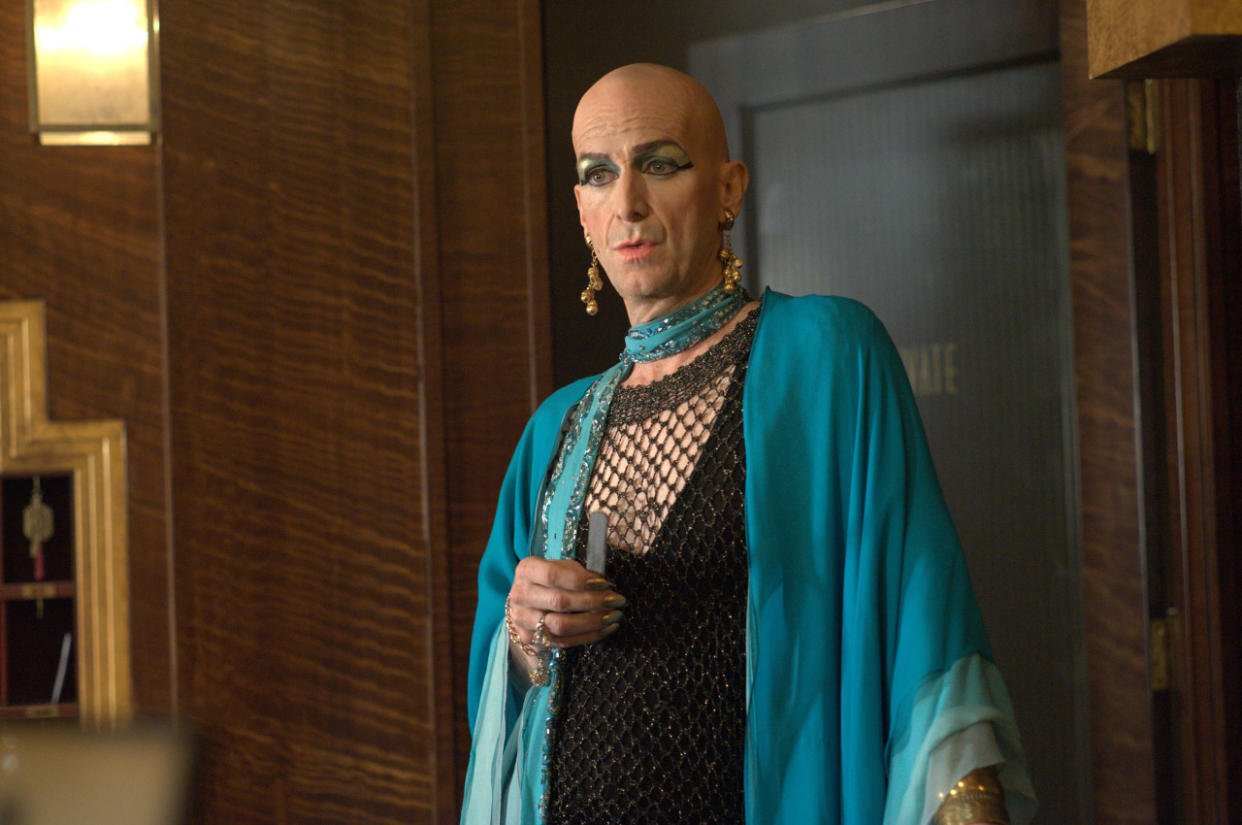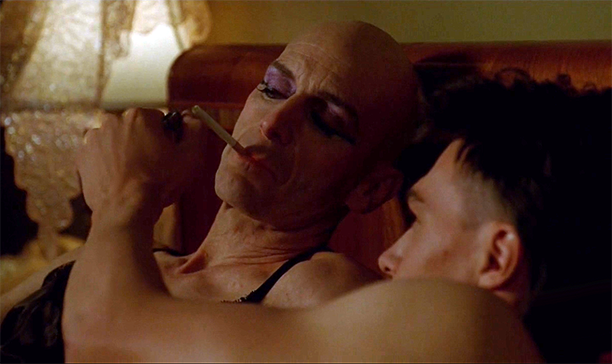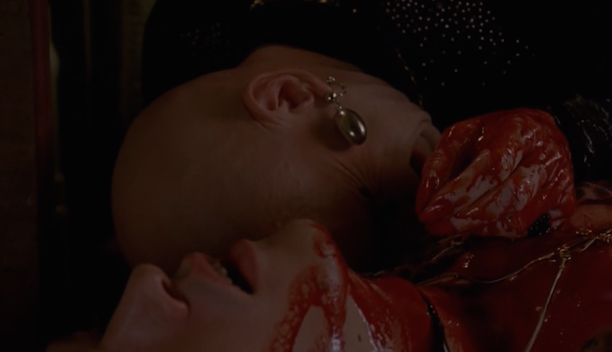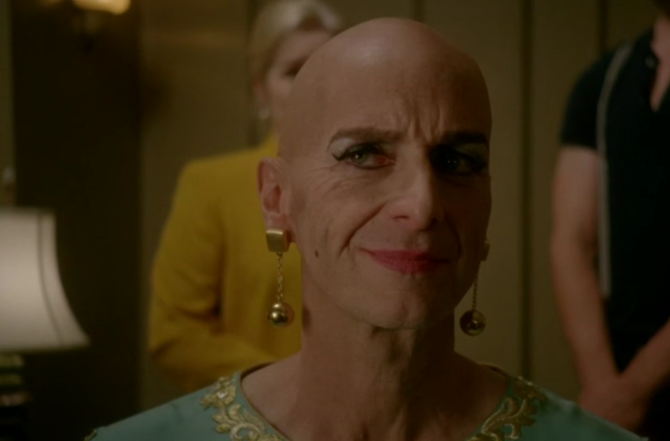Emmy Talk: ‘AHS: Hotel’ Star Denis O’Hare on Liz Taylor’s Creation, Love Story, and Fate

Denis O’Hare in ‘American Horror Story: Hotel’ (Suzanne Tenner/FX)
As we enter Emmy season — nomination voting runs though June 27 — Yahoo TV will be spotlighting performances, writing, and other contributions that we feel deserve recognition.
Many, many moons ago, someone gave Denis O’Hare a piece of advice: “If something scares you, you have to do it.”
Those words never seemed more prescient or applicable to his career than when American Horror Story creator/executive producer Ryan Murphy first filled O’Hare, one of the series’ regular players, in on what part he would play in the fifth season. The first Murphy missive described O’Hare’s AHS: Hotel character as someone inspired by a drag queen who died in a fire at a German discotheque in the ‘70s, whom Murphy had discovered during his background research. A few months later, Murphy had further honed that initial sequined spark of inspiration into something, or should we say someone, else.
“Ryan gets a very strong visual sense of a character or a setting and he builds from there, and that was certainly the case for Liz. He told me that she was a transgender woman with a shaved head, bold lip, Cleopatra eye, gorgeous, worked in the hotel,” O’Hare tells Yahoo. “Liz Taylor ended up being a very special character for me. I didn’t really necessarily think she was going to be when we started the season. When he first described the character, I got nervous and a little bit scared, even though I trust Ryan and I love all of my Horror Story characters. I never thought of playing a transgender part. I’ve never explored that side of myself. I’ve never worn high heels or put on a dress. So those weren’t things I was comfortable doing. Then I remembered [that] advice.”
So O’Hare, who also appeared on The Good Wife and The Comedians last year, jumped in bald head first. “As we started exploring her costumes, I started to find my way in. By the time I had my head shaved, she had arrived and I started to see how wonderful she was going to be to bring to life,” O’Hare says. “I remember very clearly one instance of feeling that: I always dress for rehearsal, and I was wearing this long, flowing chiffon cape and Ryan loved it. Because he saw me walking in that number, he got an idea for a low angle shot of me walking down the hotel halls with the robe behind me flowing. I took that and ran with it. That affected the character’s walk from then on.“
Related: Read our ‘AHS: Hotel’ Recaps and Postmortems
As for how the story would unfold, O’Hare learned more about Liz as the season went on, and while Murphy and other producers and writers have a strong vision at the start, O’Hare thinks they also refine and adjust ideas as they go along. “Our show is unique in that it is not created in a vacuum. We are filming while they are writing it, and they are being broadcast while we are working. There is an interaction between the writing and the audience reception, and also with what the actors are bringing to it. It is definitely a dance, a constant conversation. They put it down; we create it. They see what we create; it inspires them. It is. By the finale, she was this incredible creature who had a full backstory, love story, and finally a very beautiful death story. It turned into one of my most favorite acting experiences of my life.”
In fact, he loved Liz so much he experienced another first after the finale wrapped. “When I left the lot on the last day of playing her, I was really sad and had a very difficult day the next day. I was emotionally in a very bad place,” the two-time Emmy nominee (both for AHS parts) recalls. “I had to slap myself. ‘This is not who you are, Denis. You are not that kind of actor. Walk it off.’ I loved her journey of discovery and story of redemption. The character was so powerful that I got a little lost, and that was a new one for me. But she is a very difficult character to leave behind. I will go on to do whatever they tell me to do happily in the seasons to come, but I will always have a huge part of my heart with Liz. I will never feel like I need to go back and repeat that character because she got all her ends tied up, but she will be a hard one to top.”
It was hard for us, too, to accept that her witty reign at reception had come to an end. Our TV lives are a little less fabulous for it. Even now, months later, we miss her and Iris (Kathy Bates) kvetching about the Countess, their respective sons, the monster baby, and annoying hipsters, which is why we think O’Hare deserves to be thoroughly considered for a third time, Emmy voters. We asked him to reminiscence about his three favorite episodes.

Episode 5: “Room Service”
While Liz helps Iris deal with the Halloween-hating social media influencers demanding paté by arranging a can of cat food on a platter, Liz explains how she came to be on staff at the Cortez. The flashback shows her as an unhappy husband and father in the Midwest and as a secret crossdresser who comes to the hotel on business. The Countess finds him at this low, vulnerable point and helps him embrace transformation and christens Liz Taylor.
Denis O’Hare: It is an extraordinary episode, because I am actually playing three characters. We see Liz in her current incarnation — totally comfortable with who she is, sassy, snarky, confident, smart, oddly kind. She has taken pity on Kathy Bates’s character by not ripping her head off when she asks stupid questions and is helping her try to find her own strength in dealing with Darren Criss and his awful girlfriend. It is a great scene in the kitchen. Then we get to see Liz Taylor before she started living as a woman. We see the male incarnation at home with his wife and child, where he is being a failed father and husband. And then we see him in LA in his hotel room on the business trip as he attempts to explore this side of him. We see the nascent budding version of a transgender person. He is not there yet, and that is a distinct third character — that is whom Gaga’s character [the Countess] encounters and helps him create. It is almost a fourth character when he runs down the hallway with his ice bucket all dressed up as a woman and dares to let himself let loose for one second. There is a glimmer of a real transformation there. It is an incredibly complex episode in terms of how many layers there were to it. Emotionally, it was a minefield. It was very intense to play all those parts of him over the course of the episode. He also is confronted by his two workmates and has to feel their rage and disgust at him, and then there’s the shock as Gaga kills them so violently. He didn’t think it was going to go there. He is thankful and also freaked out, but now he’s in.
We don’t ever shoot in order, and we often crossboard, which means more than one episode can be going on during the same day or week. I think I was shooting the death scene with Tristan around the same time as I was shooting the transformation scenes with the Countess. It was incredibly taxing.

Yahoo TV: Wow, they don’t cut you guys any breaks, do they?
It is not on purpose. It is just a crazy world, and there are so many moving parts and actors with so many schedules. That is when it really comes in handy that we have all gotten quite comfortable with the directors and writers and the crew, and mostly with each other since we tend to all recur from season to season. Gaga is such a great collaborator and takes such great care to give you what you need in a scene. It is such an emotional scene, where we are shaving my head and listening to “Bette Davis Eyes.” We were doing that in the room. It was all I could do to not break down. Powerful stuff.
Do you use your own emotional history or the fact that you are a parent in your work?
I am a Stanislavski actor. That’s how I was trained. You are using the character, not necessarily yourself. You say things like, “What would that be like if this was my family?” But in that scene, I am not Denis at all. I am the character. I am creating their lives and their experience. That is the character’s son. I don’t need to superimpose my son’s face on his son’s face to get there. That being said, being a parent, you often open up that well inside of you. You don’t even have to think about it. You can call up those kinds of universal things without thinking about it because you know how it would feel. The kid playing my son was a beautiful, heartbroken boy, so all I had to do was look at his face.
I used an acting shortcut to make my job easier for the scene where my son comes back [as an adult]… I didn’t meet the actor playing him first. I didn’t socialize with him during breaks. There was no small talk or getting to know him. I wanted to see this person and have him be my son who I did not know and had not seen in years. I felt terrible. Only after we finished the day did I sit down and chat and tell him what a great job he did. I think it was the right call to get the scene right.

Episode 6: “Room 33″
The audience learns that Liz and Tristan (Finn Wittrock) have fallen in love while no one was paying attention. There’s passionate lovemaking. There’s sharing of feelings. There’s a showdown with the Countess in which Liz and Tristan come clean about their affair and ask her to let them have each other because she has so much and she can’t possibly need Tristan as much as Liz does. She seems convinced for a hot second, and then she proclaims, “I don’t share” and slits the immortal model’s lovely neck, making way for a heartfelt goodbye.
O’Hare: Liz’s life was like a mini opera, and this episode has a little bit of everything including love, tragedy, happiness, grief, and redemption. This is an example of how things are constantly evolving as we shoot the show. We were shooting episode 3 or 4, and Ryan buzzed by my ear and said, “I think you will have a thing with Tristan. Don’t tell anybody, but I want you to try to find moments to catch his eye.” Because we were not going to be able to create and film a massive backstory to those two falling in love, we had to try to find ways to hint at it. Knowing that Finn and I were going to have this major life-altering love affair made our on-screen interactions different, even before that was revealed to the audience. It made our interaction different off-screen. When I saw him in the trailer, I paid him attention in a different way. He was more gentle with me. We only got one great love scene, but it was a fantastic scene. And then he died, and I didn’t know he was going to come back until the very end. I was hoping. I would tell the writers that it would be so great if Liz could get Tristan back, but they don’t always listen to us. When I finally got him back in episode 12, it was so rewarding for Liz.

Finn only joined the cast last season for Freak Show, and you guys did not have any real scenes together, yet you were expected to film a risqué sex scene.
He came in to the freak show at the very end, when I was in the cage with my arms and legs chopped off and I was now the chicken man. He hears my clucking. That was it. It is funny to imagine we went from that to being in bed together rolling around naked.
The funny thing about that is I am extraordinarily sensitive to the other actor’s comfort level in that kind of scene, and I have to fight my tendencies to take care of others and instead take care of myself. Because it is vulnerable for me, too. Finn and I both love that scene. Funny enough, the lovemaking part was probably the most technical part of the scene. We were frank about saying, “Okay, what are we doing here? Is it full-on anal sex? Is it foreplay? Are we cuddling? What are we showing?” Very no-nonsense. And the director was so good about it. He would say, “Okay, Denis, we’re going to start with your hand coming up on his chest. I want to see your nails coming up his body. Then maybe you riding him, and then we will flip over and have him on top.“ So I said, “Are we finishing?” You have to have the exact details and shots so you can figure out the physical architecture of the scene. You establish the choreography like hands, hands, hands, riding, riding, riding, flip over, rolling, rolling, kissing, finish, cigarette. I will never forget the first rehearsal. Finn thought we were shooting, so he really went for it. There was a mess of hands and body, and they didn’t yell cut, because there really wasn’t a place to do that, and then they finally said, “Okay, looks like you’re ready, so let’s shoot one.” The look on Finn’s face was priceless. He was like, “Oh god, that was just the rehearsal, wasn’t it?”
It is also the sort of thing that you don’t want to talk about too much. You just do it and get it done, and that’s what we did. He is a very brave actor, and I enjoyed every moment of it. And the scene afterward was so powerful. We felt like we could do it all night. We did like 10 or 12 takes, and every take there was a new discovery. Every take we found new depth. In the middle of it Tristan asks, “Do you love me?” And I basically tell him yes, but the third time I really saw him ask the question and I suddenly realized that Tristan needed to be loved and he needed to know that answer, and it was so touching to know his character needed my character to fill that need. There were just so many layers to that one scene. It was a really extraordinary day of shooting.

Was it easier to film the lovemaking or the death and heartache?
Both require different things. Film and TV acting are different than theater acting in that you are going to do the same scene 10 or 15 times in the space of two or three hours, and you have to figure out when you are going to be empty and worn out and how do you pace yourself? What’s the shot? If you are at the back of my head, I am going to power down a little and save my resources for the extreme close-up. There was this intense scene where I was looking into a compact mirror, weeping, and then trying to get myself put back together. We shot a bunch before lunch and got it. It was a really difficult scene and then we came back from lunch and they said, “We are just gonna grab a close-up for that scene from before lunch.” I was like, “What? Now it is out of my mind. I am nowhere near that emotional space now. I need the makeup guy. I need some menthol for tears.” They couldn’t find makeup, so I went in the corner and tried to find my way back. Everyone sat quietly and no one spoke. I gave a little finger to say I’m ready, and everyone stayed quiet and we shot it. I was able to weep on cue again, and that’s the shot we used. I was so glad we couldn’t find the guy. I felt like I accomplished something.

Episode 12: “Be Our Guest”
O’Hare handles voiceover narration in this wrap-up episode in which viewers are treated to a rarity in AHS land — a happy ending. Liz and Iris take over the hotel, remodel, get the ghost problem under control, and actually make the place successful again. Liz also becomes the business face of Will’s fashion line and a grandmother. She has patched things up with her son and gets along swimmingly with his wife. But as one of the only mortals left in this terror tale, she is diagnosed with terminal prostate cancer and chooses to become a ghost. The Countess reappears to kill her “fondest creation,” and Liz is reunited with Tristan, who had stayed hidden because Liz “had more living to do.”
O’Hare: I thought it was a fantastic way to end the season and her story. It was a surprising evolution, because I don’t think you see that character walking down the hall in episode 1 and think that will be the character you will end up identifying with. They do a very good job of following their instincts and adapting the story to go where the strengths are. Liz became such an interesting character and demanded attention. She had integrity and a moral center. She wasn’t a gentle soul or always sweet to people, but she was a truth-teller. She was a prophet in that way. She was truly trying to find her home and her people and live her life. Because her motivation and heart were pure, it is only right that she was rewarded.

It was so interesting, the timing of a transgender character given Caitlyn Jenner and Laverne Cox are in the news.
Her being transgender and that she has gone on this journey of discovering is central to this character, but it is also oddly irrelevant. She is just a person. The facts of her arrival and her gender are not the most interesting things about her. Her sense of fairness, her loyalty, her convictions, her humor were more interesting pieces of her — and those are what the viewers ultimately responded to. I don’t think the viewers are watching and connecting with her because she is a token, metaphor, or a symbol.
What was your own personal take-away?
Every character teaches you something. She gave me a certain sort of edgy confidence that I never had. I feel like an outsider in Hollywood. I don’t feel known or accepted. I don’t feel like part of the club, especially at awards shows. There was a little bit of “f*** it” that Liz brings to everything that I brought to the Golden Globes [O’Hare wore heels with his suit, and makeup]. I learned to care a little less and have a good time. I am going to do what I want to do. That particular thing is not a trick I will likely repeat. But the confidence that Liz gave me is here to stay.

O’Hare at the Golden Globes (Todd Williamson/Getty Images)
Read more Emmy Talks:
Emmy Talk: ‘Better Call Saul’ Star Rhea Seehorn Breaks Down Season 2’s Big Confrontation
Emmy Talk: ‘Master of None’ Co-creators Aziz Ansari and Alan Yang
Emmy Talk: ‘People v. O.J. Simpson’ Star Sterling K. Brown
Emmy Talk: ‘The Americans’ Star Alison Wright
Emmy Talk: ‘Jessica Jones’ Star David Tennant
Emmy Talk: ‘The Grinder’ Fred Savage
Emmy Talk: ‘Silicon Valley’ Star Thomas Middleditch
Emmy Talk: ‘Crazy Ex-Girlfriend’ Songwriting Duo Rachel Bloom and Adam Schlesinger
Emmy Talk: ‘House of Cards’ Star Joel Kinnaman
